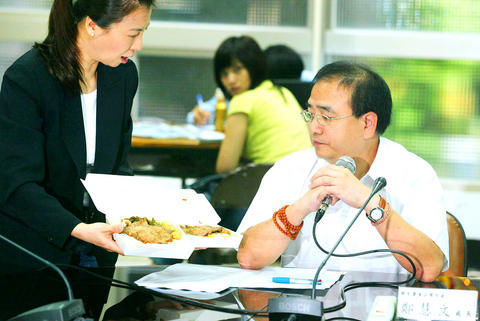The Cabinet yesterday announced that it has no intention to make any changes to regulations concerning the usage of the veterinary drug ractopamine at the moment.
"We will not do anything before we finish discussing with related professional personnel and analyzing all the data we have collected," said Cabinet Spokesman Shieh Jhy-wey (謝志偉). "No matter what we do, public health and pig farmers' rights will always be our concern."
Shieh made his remarks during a press conference at the Government Information Office yesterday morning.

PHOTO: CNA
In addition to the announcement, Shieh also said that officials from the Council of Agriculture (COA) are planning to meet with local pig farmers today to understand their concerns and let them know what the government has been doing regarding the issue.
Shieh mentioned that related WHO regulations will be important references for the government in establishing future policies on the usage of the drug.
"As far as I am concerned, the WHO is now working on a review and re-evaluation on the issue and the results will be available in September. That will become an important reference for us for sure," Shieh said.
Meanwhile, several Democratic Progressive Party (DPP) legislators put forth a legislative proposal yesterday, urging the government not to relax restrictions on the drug's use.
At a joint press conference, DPP Legislator Wu Ming-ming (吳明敏) said people's health would be influenced if the government allows pork imports with ractopamine because it is difficult for people to differentiate between local and imported pork.
"Taiwan cannot allow two different regulations of ractopamine," DPP Legislator Yen Wen-chang (
DPP Legislator Chen Hsien-chung (陳憲中), who initiated the proposal, urged the government to defend the "character of the nation."
"The government should not lift the ban just because there was pressure from other countries," he said. "In terms of many issues, we have to defend our dignity."
At a separate event, the Taiwan Solidarity Union (TSU) caucus criticized the DPP government's policy as "US-oriented" only.
TSU Legislator Yin Ling-ying (
"The government said it had used Japan's policy as reference while planning new regulation on ractopamine, but it failed to notice that Taiwanese people have different diet habits from Japanese people," TSU caucus whip Tseng Tsahn-deng (
Also yesterday, the Consumers' Foundation urged Taiwan consumers to boycott US pork.
At a news conference held over the government's about-face on the policy on the use of ractopamine in pigs and cattle, foundation officials called for consumers to reject imported US pork and fast food that might also use ractopamine-contaminated US pork.
Foundation secretary-general You Kai-hsiung (游開雄) criticized the government for having succumbed to US pressure by lifting its ban on ractopamine, which the COA banned last October after cases were reported abroad concerning the effect of the drug on consumer health.
Citing seven cases related to ractopamine poisoning reported in Hong Kong and the Chinese province of Guangdong between 1997 and last year, You said more than 100 people in the two areas developed symptoms, including racing heartbeat, dizziness, difficulty breathing, headache, muscle cramp, vomiting, diarrhea and high blood pressure, after consuming pork containing ractopamine.
One patient died 15 days after being rushed to hospital, he said.
Currently, he said, ractopamine is not banned in only 24 countries, including Japan and the US, and is banned in more than 160 countries, including Taiwan, China and members of the EU.
Additional reporting by CNA

A magnitude 4.9 earthquake struck off Tainan at 11:47am today, the Central Weather Administration (CWA) said. The hypocenter was 32.3km northeast of Tainan City Hall at a depth of 7.3km, CWA data showed. The intensity of the quake, which gauges the actual effect of a seismic event, measured 4 in Tainan and Chiayi County on Taiwan's seven-tier intensity scale, the data showed. The quake had an intensity of 3 in Chiayi City and County, and Yunlin County, while it was measured as 2 in Kaohsiung, Nantou County, Changhua County, Taitung County and offshore Penghu County, the data showed. There were no immediate reports of

Weather conditions across Taiwan are expected to remain stable today, but cloudy to rainy skies are expected from tomorrow onward due to increasing moisture in the atmosphere, according to the Central Weather Administration (CWA). Daytime highs today are expected to hit 25-27°C in western Taiwan and 22-24°C in the eastern counties of Yilan, Hualien, and Taitung, data on the CWA website indicated. After sunset, temperatures could drop to 16-17°C in most parts of Taiwan. For tomorrow, precipitation is likely in northern Taiwan as a cloud system moves in from China. Daytime temperatures are expected to hover around 25°C, the CWA said. Starting Monday, areas

A Taiwanese software developer has created a generative artificial intelligence (AI) model to help people use AI without exposing sensitive data, project head Huang Chung-hsiao (黃崇校) said yesterday. Huang, a 55-year-old coder leading a US-based team, said that concerns over data privacy and security in popular generative AIs such as ChatGPT and DeepSeek motivated him to develop a personal AI assistant named “Mei.” One of the biggest security flaws with cloud-based algorithms is that users are required to hand over personal information to access the service, giving developers the opportunity to mine user data, he said. For this reason, many government agencies and

Taiwan has recorded its first fatal case of Coxsackie B5 enterovirus in 10 years after a one-year-old boy from southern Taiwan died from complications early last month, the Centers for Disease Control (CDC) said yesterday. CDC spokesman Lo Yi-chun (羅一鈞) told a news conference that the child initially developed a fever and respiratory symptoms before experiencing seizures and loss of consciousness. The boy was diagnosed with acute encephalitis and admitted to intensive care, but his condition deteriorated rapidly, and he passed away on the sixth day of illness, Lo said. This also marks Taiwan’s third enterovirus-related death this year and the first severe